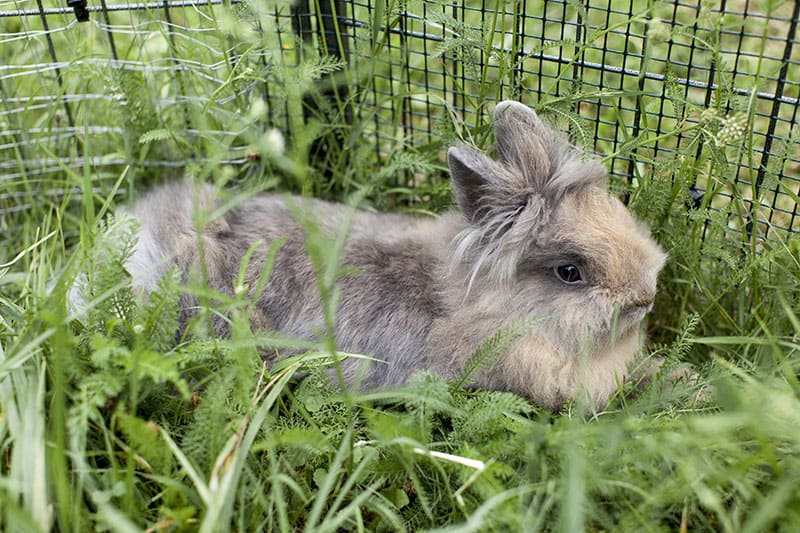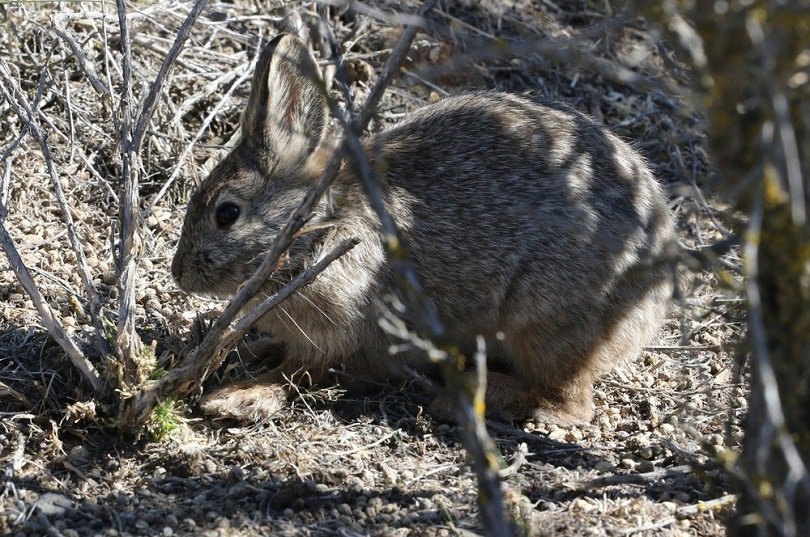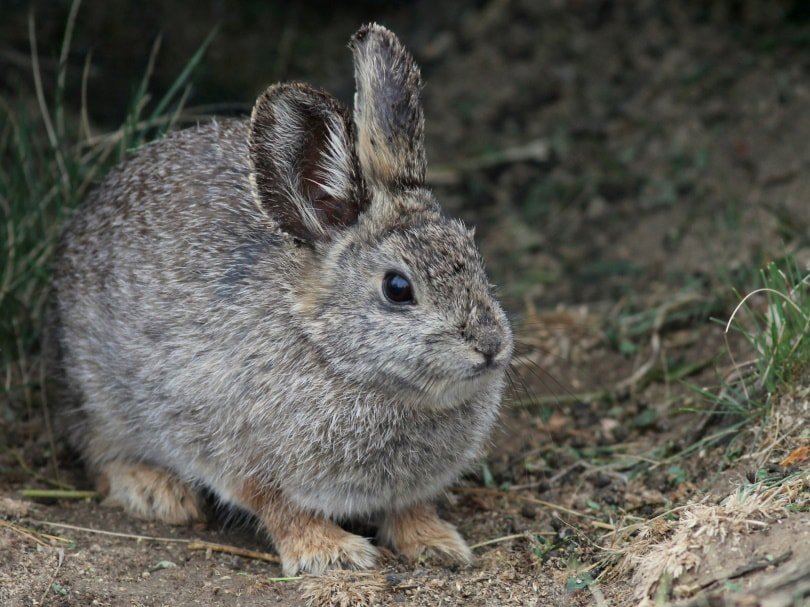The Pygmy rabbit is a species of wild rabbit native to the United States. They are quite different from other species and the only within North America to dig their own burrow. These adorable, pint-sized rabbits are not to be confused with dwarf rabbit breeds and are not kept as pets.
These unique little critters have a very limited geographical range, and an isolated population are listed as endangered by the United States government. In this article we’ll learn more about the Pygmy rabbit and what makes them stand apart from other rabbits.
| Size: | 9- 12 inches |
| Weight: | 375–500 grams |
| Lifespan: | 3 – 5 years |
| Similar Breeds: | Netherland Dwarf, Dutch Dwarf rabbit, Mini Lop |
| Suitable for: | The wild |
| Temperament: | Timid, not suitable as pets |
The Pygmy rabbit is the smallest species of rabbit in North America, with adults reaching no more than 12 inches in length and weighing between 375 and 500 grams. As part of the Leporidae family, the Pygmy stands out among the rest not only because of their small size, but also their short ears, small hind legs, barely visible tail, and gray coloration with a complete lack of white fur.
While most wild rabbits naturally have short lifespans, the Pygmy rabbit lives on average 3 to 5 years, though many won’t make it past two years of age.
Pygmy Rabbit Characteristics
[yasr_multiset setid=7] Temperament & Intelligence of the Pygmy Rabbit
Temperament & Intelligence of the Pygmy Rabbit
Rabbits are prey animals, so they are naturally shy, fearful, and easily stressed in the presence of humans or other animals. While they are intelligent, their priority is survival and their first instinct when approached is to flee and run for cover.
Do These Rabbits Make Good Pets?
Pygmy rabbits are an endangered species of wild rabbit and cannot be bought and kept as pets. For those looking for an extra small pet rabbit, there are plenty of dwarf and extra small breeds available within the pet trade.. Pygmy rabbits have an isolated population, known as the Columbia Basin Pygmy rabbit, which is listed as an endangered species with ongoing conservation efforts. Anyone that spots one of these rabbis in the wild is asked to contact the Washington Department of Fish and Wildlife to report the sighting.
Does This Rabbit Get Along with Other Pets?
Wild rabbits like the Pygmy will avoid other wild animals and domesticated pets. They can easily fall prey to local predators such as coyotes, bobcats, weasels, badgers, and various birds of prey such as hawks, eagles, and owls. Therefore, these animals are very fearful and will be quick to run and hide.


Things to Know About Pygmy Rabbits:
Food & Diet
Pygmy rabbits are herbivorous animals that survive on a diet of sagebrush and grass, and the ratio adjusts depending on the time of year. In winter, up to 99% of the Pygmy rabbit’s diet consists of sagebrush, but when the summer months hit, they increase their grass intake. In summer, the diet is 30%–40% grass-based, and pygmies have a taste for native bunchgrasses in particular.
Habitat
Sagebrush isn’t just a Pygmy rabbit’s favorite meal—it’s also the place they call home. Pygmy rabbits can be found in areas with dense sagebrush (shrub grasslands, plateaus, mountain valleys, mountain slopes, etc.), and they dig their own burrows within these areas.
The Pygmy rabbit’s burrows are dug out of loose soil and are close to water, though the rabbits do sometimes use burrows dug out by other animals. This species of rabbit is distributed across several U.S. states including Montana, Nevada, Oregon, Utah, California, Idaho, Wyoming, and Washington. Pygmy rabbits currently span 7–8 million acres across these states, but they were historically dispersed across 100 million acres.
Population Threats
The most significant threats to the Pygmy rabbit population are habitat degradation, habitat fragmentation, and predators. Pygmy rabbits are preyed on by a number of species, including American badgers, owls, hawks, weasels, and coyotes. In the case of the endangered Columbia Basin Pygmy rabbit, land development and farming have played a large part in the dwindling of the species, as have the incidence of wildfires.
Conservationists working to save the Columbia Basin Pygmy rabbit population have also faced another obstacle; the parasite coccidia, which has killed off some of the baby rabbits. On the bright side, the Columbia Basin Pygmy rabbit population has been boosted up to around 100 thanks to the efforts of conservationists. This is a vast improvement since only 16 remained in 2001.

Mating Habits
Pygmy rabbits start to breed when they’re around 1 year of age, and the breeding season starts in February and ends in July. Copulation is over very quickly, and the gestation period is around 27–20 days. Litters are born in the summer, and each litter contains an average of six kits.
When preparing to give birth, the female Pygmy rabbit will dig a shallow burrow to give birth and nest in. The female fills this burrow with material to form a nest and covers the entrance with soil for safety. Kits don’t stay with their mothers long—typically only for around 15 days. Rabbits are more likely to be killed by predators when in their first 5 weeks of life.

Male vs Female
The only differences between males and females are size and breeding related. Female Pygmy rabbits are a bit bigger than males, and females are the ones that provide parental care in the first weeks of life. We didn’t find any evidence to suggest that male Pygmy rabbits perform any parental duties.


5 Little-Known Facts About Pygmy Rabbits
1. Pygmy Rabbits Dig Their Own Burrows
This behavior is very rare in rabbits. Many sources state that Pygmy rabbits are the only rabbits in the U.S. to dig their own burrows, but some sources (including Conservation Northwest and Washington Department of Fish & Wildlife) say they’re one of two species to do so. The other species is not mentioned.
2. Columbia Basin Pygmy Rabbits Are Unique
The Columbia Basin Pygmy rabbits—which are endangered—are an isolated population with different genetics from Pygmy rabbits outside the area. It’s estimated that this population could have separated from the general Pygmy rabbit population up to 115,000 years ago.
3. Wildfires Have Seriously Hampered Conservation Efforts
If things weren’t already challenging enough for Pygmy rabbit conservationists, the 2017 Sutherland wildfire killed an estimated 70 Columbia Basin Pygmy rabbits. 32 were evacuated. In 2020, the Pearl Hill fire wiped out 43% of the Columbia Basin Pygmy rabbit population. Nevertheless, conservationists continue to fight for this endangered population’s survival.
4. Pygmy Rabbits Only Weigh Up to 1 Pound
To put into perspective just how tiny and light the Pygmy rabbit is, here are some metrics for comparison:
| Pygmy rabbit: | up to 1 pound |
| Netherland Dwarf rabbit: | up to 2.5 pounds |
| Lionhead: | up to 3.75 pounds |
| Dwarf Hotot: | up to 3 pounds |
| Jersey Wooly: | up to 3.5 pounds |
| Standard Rex: | up to 11 pounds |
| Flemish Giant: | up to 22 pounds |
5. Pygmy Rabbits Are About the Size of a Mango
To add to fact number four if you were to ever hold a Pygmy rabbit in your hand, they’re so small that they’d fit right on your palm.

Final Thoughts
Pygmy rabbits are incredibly unique, and the Columbia Basin variety is the ultimate survivor of the rabbit world, continuing to live on even in the face of disease, wildfire, habitat loss, and habitat fragmentation. This unique population wouldn’t have survived this long, however, without the consistent efforts of passionate conservationists.
Featured Image Credit: Randy Bjorklund, Shutterstock
